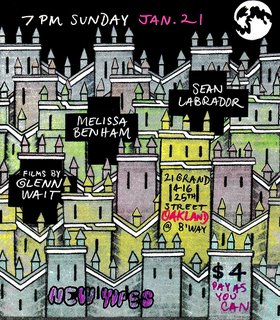I've been deep thinking (perhaps akin to
Pauline Oliveros' Deep Listening) a lot recently about the concept of neighborhood. The current state of my neighborhood in East Oakland (itself something of a neighborhood in relation to the rest of Oakland) is complex. Where I live used to be the soveriegn city of Melrose, annexed by Oakland some time back. Melrose then became an Oakland neighborhood. Then real estate developers carved it up in the 30s & 40s giving neighborhoods like Maxwell Park a slice of Melrose to Melrose's dimishment. Then more recently, other neighborhoods have been delineated within the older boundaries, so that say Maxwell Park, which was carved out of Melrose, is now halved by a new neighborhood called Fairfax. The smaller neighborhood demarcations help to sell houses apparently.
The block I live on (57th Ave & Int'l Blvd.) was once Melrose, but is now considered a part of the Seminary neighborhood, which didn't exist on any Oakland map until very recently.
This doesn't seem to matter all that much, but it really does. Who decides which neighborhood you live in has political, social and economic consequences. Picardy, for example, is a single street that used to be in the Seminary-and-before-then-Melrose neighborhood. They have received a lot of attention for displaying Christmas lights (no joke), so the real estate folk have designated this a separate neighborhood. Are the neighborhood schools in Picardy any better for it? No, the Picardy children still attend the same schools located in the same places as before the new demarcation, going to the same schools they always did outside of Picardy. Do the cops come quicker? Doubtful, this is still East Oakland. The only advantage is a better listing on the housing market.
When I was growing up on the Eastside of Detroit*, I never thought of this since my friends & I thought of everything in terms of police precints--I lived in the 5th precint. If I met someone from outside of the Eastside, then I might have used the more generic term Eastside.
In my old Brooklyn neighborhood, there may have been a block or two of grey area between Clinton Hill and Fort Greene, but the idea that at some point real estate developers could come in and decide that Pratt Institute and the 3 surrounding blocks on all sides should now be called Pratt seems unthinkingable--no not unthinkable--but
highly unlikely.
And yet this is happening in Oakland. Uptown? Does Oakland have a fixed idea of where Downtown is? Where does Downtown end?
I've been looking at scores of Oakland neighborhood maps, most commissioned by either Alemeda county or the city, and have been wondering who exactly is benefitting from this trend of hyper-defining the neighborhoods in East Oakland and other similar neighborhoods. The better, more relevant question to ask is who is losing from it?
___________
*
There's this one Journey song from the 80s, memory fails me at the moment (Don't Stop Believin', I googled), that mentions Southside Detroit. The Southside of Detroit would be exactly in the Detroit River connecting Lake St. Clair with Lake Erie.







